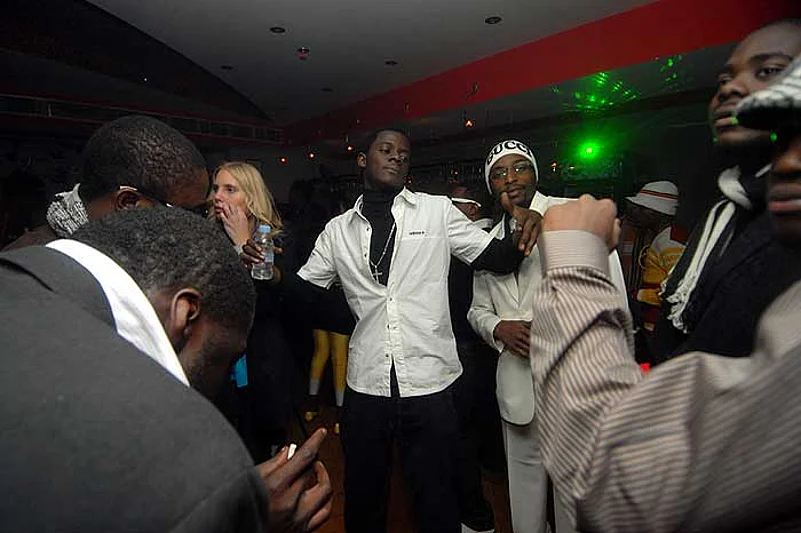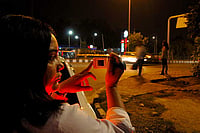Doski Sly, a 31-year-old Nigerian, ticks off a list of things he had better be careful about while living in India. “I can’t talk to Indian women without the threat of being beaten up. I can’t rent a house without being humiliated, I can’t go to just any nightclub I want—they won’t let me in since I’m black. Plus, I can’t get my hair cut or beard trimmed at Indian salons, because our hair is different, and they don’t know how to cut it,” sighs this student of a private university in Delhi.
Sly’s dilemmas aren’t his alone, but actively shared by a majority of African expatriates in India. As African American Diepiriye S. Kuku-Siemons, PhD scholar at Delhi University, points out, “We still have to be chaperoned in Indian spaces by Indians.” But Indian racism towards Africans is an old story. The new story is that Africans like Doski and Diepiriye are no longer confined or constrained by that racism. Rather, that very sense of exclusion is quietly cracking open new avenues for the African expat community that the mainstream may only be dimly aware of.
For instance, you or I may not be getting this SMS making the rounds on a Friday evening, but chances are almost every young African expat in Pune will: “African nites @Its Best @Loop Lounge...Lets Get u 2 Another Level With Best Of Mixes...9 pm On.” One of the DJs playing at this party, 27-year-old Nigerian Felix Apara, knows it’s going to be a typical African night: an enthusiastic African crowd with a sprinkling of Indians, mostly from the Northeast; the ladies moving around in large groups to ward off, as one put it, “over-friendly and sometimes wild Nigerian men”; beer flowing freely, and dancing till the wee hours. By Felix’s account, it’s a “social gathering, where everyone knows everyone”.
No wonder, then, that the popularity of “African nights” in Delhi, Bangalore, Chennai, Pune and Mumbai is growing; a rollicking show of strength in the face of the open racism practised by some Indian clubs against African clubgoers. Namibian Rodney Manyando, a student at Delhi’s Jamia Millia, says: “We make it a point to go to places where we find our own community, or hang out with people from the Northeast, who are also discriminated against. In Delhi, we frequent places like Hookah, Amigo, S Lounge, Aquum or Ai that are open to African crowds and sometimes host African parties.” Adds Diepiriye, “We’re reaching a critical mass in nightclubs, thanks to the growing sms tradition.”

The African hair salon in Krishna Nagar, south Delhi. (Photograph by Sanjay Rawat)
What also help get the word out are Facebook groups such as ‘Mumbai expats’, ‘Africans in Hyderabad’ or ‘Union of African communities in Bangalore’, where every member is clued into where the next “African Night” is. As a Tanzanian student in Delhi, Daniel Amon, 23, puts it, “Before Facebook, it was all about knowing the right people so you got the right SMS. But now, all Africans in India can be a part of that circle through social networks.”
Says Bader Essafi, who stayed back to study in Delhi when his diplomat parents left the country for their native Libya, “Some of the clubs in Gurgaon are so full of Africans that you would think you are somewhere in Africa!” For others, it’s the music that counts more than the crowd. “I won’t waste my time going to a club with only Indians because I don’t like the music they play, especially Bollywood music,” says 23-year-old Moises Mario from Mozambique, a student at Jamia Millia.
Now, with a growing number of Indian DJs opening up to playing ‘African’ music like Afropop, dancehall, R&B, hip-hop and reggae, and African DJs like Felix having a shot at the turntable, Moises is increasingly getting what he wants. Felix, too. “In Pune alone, there are about 10 Africans DJs who play at three different venues in the city,” he says.
These are not the only sign of a new savviness among African expats. Check out the African Hair Salon and Boutique in Krishna Nagar, south Delhi, where the chairs haven’t even shed their plastic cover yet, for another snapshot of a community beginning to create its own comfort zones in an alien land. Peppy music fills the air while posters of funky Afro hairdos cover the freshly-painted walls. Cupboards are stacked with colourful dresses, hair products and artificial hair for braiding, all imported from Nigeria. Fancy a Bob Marley hairdo? Owner Casmir Nwakaeze aka Bruno is happy to oblige. “I heard so many people here lament the lack of an African salon that I thought it might be a good business to start,” he says, pointing out proudly that customers come all the way from Gurgaon.
Sounds like a lot of fuss over hairdressing, but African expats will tell you that finding the right salon for their hair is trickier than it sounds. Ask Misa Andrianarison, a 22-year-old student of Delhi University from Madagascar, whose ongoing battle with Indian salons has her exasperated. “They always mess up my hair, even though I tell them to be gentler and take more time over it,” she says. Afro-textured hair is thicker and woolier than Indian hair, and more prone to breakage while combing or brushing, she explains. Twenty-year-old Aurelia Shiro, a Kenyan student in Bangalore, has even sometimes considered shaving off her braided hair. “There are no African salons here; you have to go to African women who will braid your hair for anything between Rs 1,000-3,000. That’s a big dent in my pocket!”
Delhi is a step ahead, not just when it comes to salons, but also African speciality stores. A peek into the African Spices outlet at Delhi’s INA market (with a branch elsewhere in the city) is like a crash course in African spices. The shops, run by Nigerian Godson Franklin, also offer dried fish, Nigerian palm oil and the popular Ugu leaves, used to make traditional stews. Even without shops to call their own, though, Bangalore Africans contrive to have their cookouts—no meeting of the African Students’ Association here is complete without Kenyan style chicken with carrots and tomatoes. By night, however, Association president Aurelia and friends are on their way to the best gig in town—one where they needn’t worry about being turned away. This is closest to home it’s ever been in India.


























